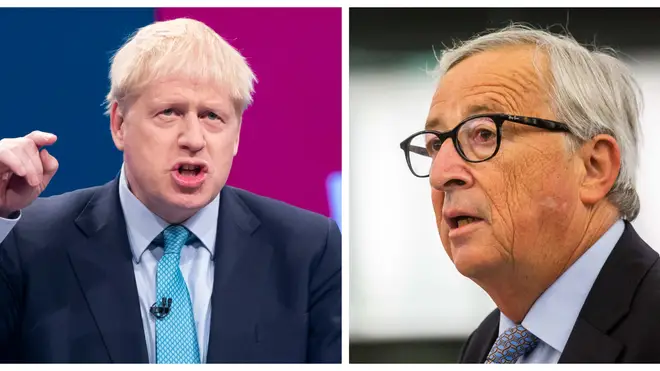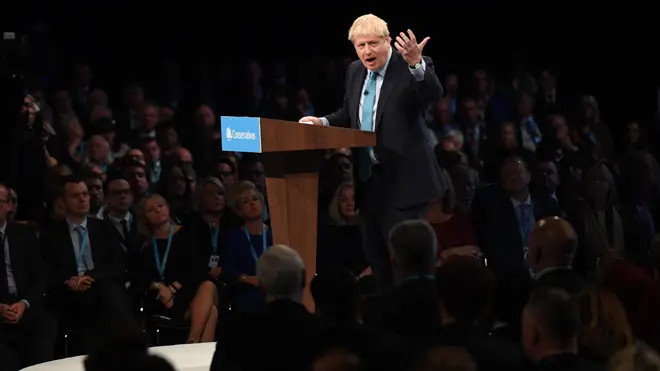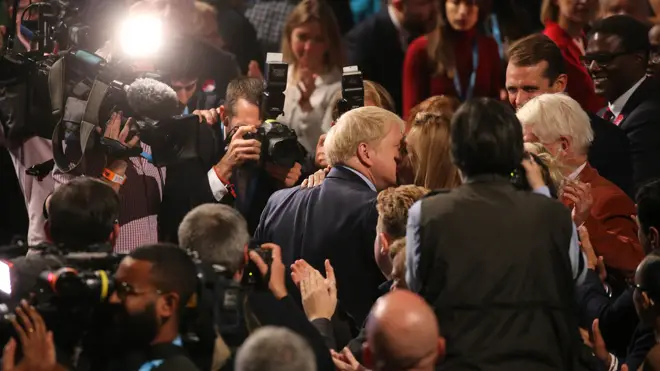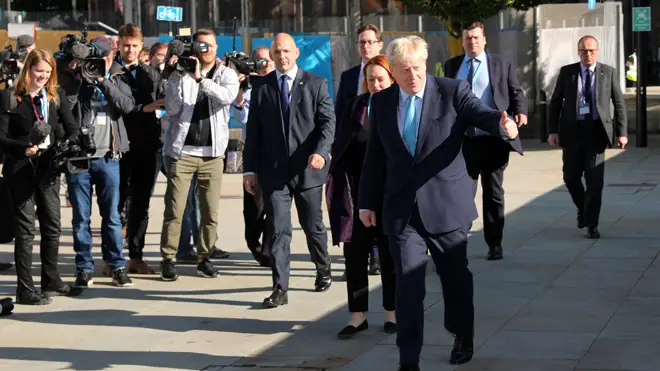
Tonight with Andrew Marr 6pm - 7pm
2 October 2019, 15:14

Boris Johnson has laid out his final Brexit deal proposal to replace the Northern Ireland backstop and urged Brussels to compromise with the UK.
In a letter addressed to EU Commission President Jean Claude-Juncker, the prime minister proposed the creation of an all-island regulatory zone" to essentially keep Northern Ireland in the European single market for goods, including foods.
This zone, the letter says, would eliminate all regulatory checks for goods traded between the two countries, and ensure regulations are the same in Northern Ireland and the EU.
This zone would first need to be approved by the Northern Ireland Assembly, who would then vote on the terms every four years after a transition period ended.
There was no mention of the fact Stormont has not sat in three years.

But responding to the letter, EU chief negotiator Michel Barnier said a "lot of work still needs to be done," while Guy Verhofstadt said they were "absolutely not positive" about Mr Johnson's plan.
Mr Barnier told reporters: "There is progress. But to be frank, a lot of work still needs to be done to reach, to fulfil, the three objectives of the backstop - no border, all-Ireland economy, and protecting the single market.
"That means protecting the consumer, the citizens, and the businesses inside the single market, the 27 member states.
"So now we will continue to work, to work to reach a deal. The no-deal will never be the choice of the EU. Never. So we will continue to reach a deal and to work with the UK team."

Mr Verhofstadt, who chairs the European Parliament's Brexit steering group, added: "It doesn't provide the necessary safeguards for Ireland."
The prime minister told Brussels that failure to reach a Brexit deal would be a "failure of statecraft for which we would all be responsible".
The new plan claims to be an alternative to the backstop, a highly controversial part of Theresa May's plan which failed to get through Parliament three times.
In the letter to EU Commission President Jean Claude-Juncker, Mr Johnson declared the backstop was the "road to nowhere" and "a new way forward must be found."

The document said the "highest priority" for any agreement reached between the two leaders must comply with the Good Friday agreement.
The DUP, who are currently propping up the Tories in the Commons, said it welcomed the new proposal, saying: "These proposals would ensure that Northern Ireland would be out of the EU Customs Union and the Single Market as with the rest of the United Kingdom."
However, The Republic were less complimentary. Irish Taoiseach Leo Varadkar said what is being put forward is "not promising" and does not form "the basis of an agreement."
Mr Johnson said the plan had five elements:
- A commitment to a solution compatible with the Good Friday Agreement
- Confirmation of support for long-standing areas of UK-Ireland collaboration including the Common Travel Area and north-south co-operation
- The potential creation of an all-Ireland regulatory zone covering all goods including agri-food
- The consent of those affected by that all-Ireland zone with the Northern Ireland Executive and Assembly given the chance to endorse the plan before it comes into effect and then every four years
- Northern Ireland will be fully part of the UK customs territory and outside the EU's customs union.
Mr Johnson claimed the plan was "entirely compatible with maintaining an open border in Northern Ireland".
He told Mr Juncker that because the goods trade between Northern Ireland and Ireland made up "a little over 1% of UK-EU total trade in goods" it was "entirely reasonable to manage this border in a different way.
Any risks arising from the proposals would be "manageable", particularly as imports from third countries would be controlled by EU and UK customs authorities.
Under the plan there would be "decentralised" customs regimes, with paperwork conducted electronically as goods move between the two countries.
But Mr Johnson acknowledged there would need to be a "very small number of physical checks", which he claimed could be conducted at traders' premises or other points in the supply chain - rather than at the border.
He called for the two sides to work together to find "flexible and creative solutions", coupled with a joint commitment "never to conduct checks at the border in future".
Mr Johnson said the continued regulatory alignment across the island of Ireland could continue "for a potentially prolonged period" after the end of a transition period if Stormont agrees.
But the requirement for the consent of the Northern Irish Assembly meant that EU rules "cannot be maintained indefinitely if they are not wanted".
The Prime Minister said: "I hope that these proposals can now provide the basis for rapid negotiations towards a solution, together with finalisation of the necessary changes to the Political Declaration reflecting the goal of a comprehensive Free Trade Agreement, so that an Article 50 agreement can be reached, and the UK can leave the EU in an orderly fashion on October 31.
"This will allow us to focus on the positive future relationship that I believe is in all of our interests."
Mr Johnson's letter also signalled extra investment for Northern Ireland.
The "New Deal for Northern Ireland" would have "appropriate commitments to help boost economic growth and Northern Ireland's competitiveness, and to support infrastructure projects, particularly with a cross-border focus".
Mr Johnson's Democratic Unionist Party allies backed the proposals.
In a statement the party said the plans were a basis for the EU to continue "in a serious and sustained engagement with the UK Government without risk to the internal market of the United Kingdom" and they "ensure democratic consent to the specific alignment proposals".
"Further work remains to be completed between the UK and the European Union but we would encourage all concerned to approach these discussions in a positive mindset within a spirit of wanting to secure a negotiated withdrawal agreement that can allow everyone to focus on future relationships," the DUP added.